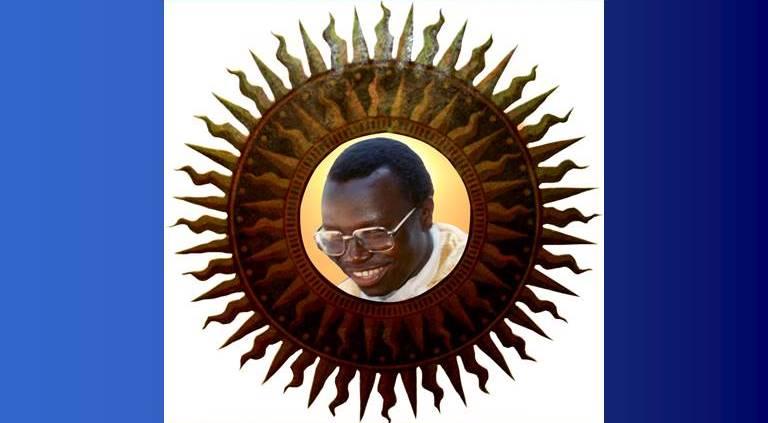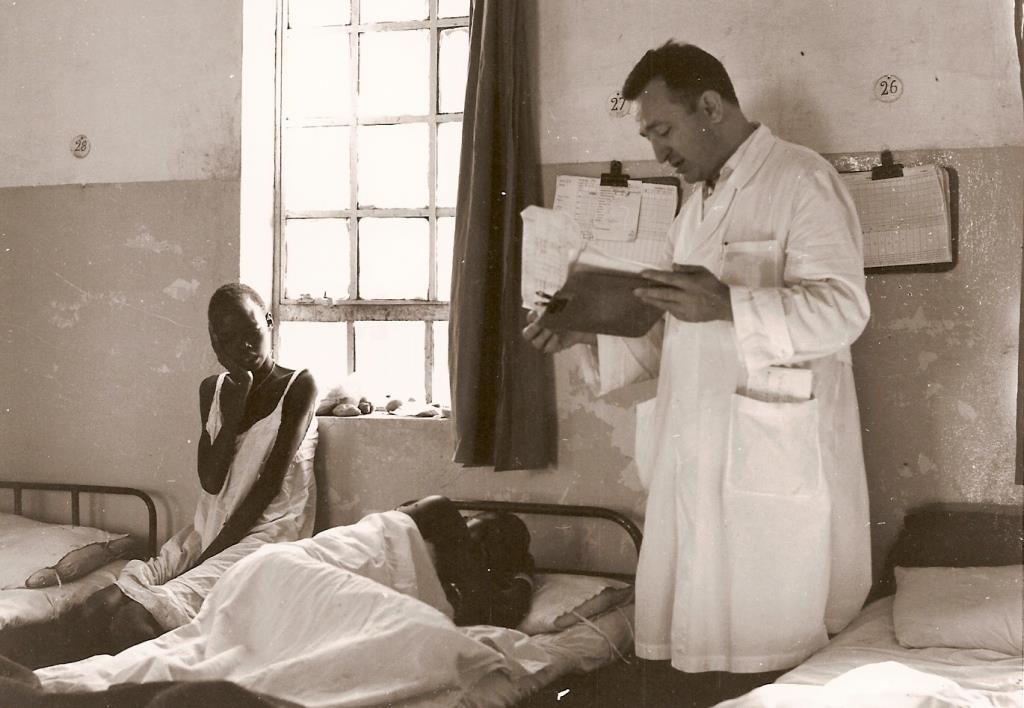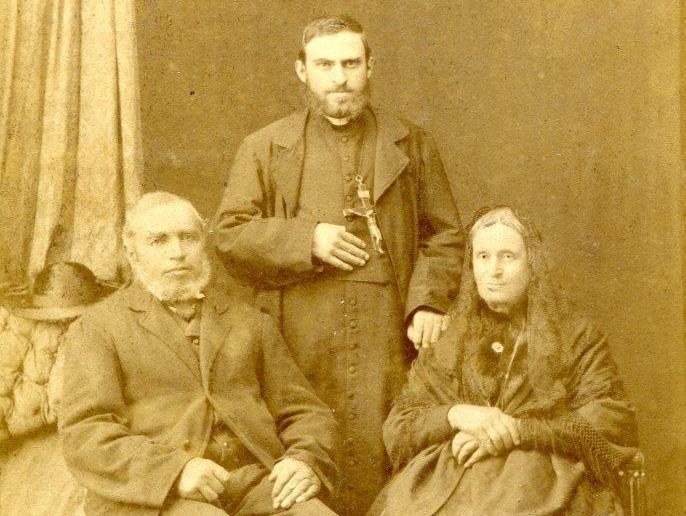Daniel Comboni
Comboni Missionaries
Institutional area
Other links
Newsletter

Cona (Venice) 22.09.1928
Pajule (Uganda) 29.01.1990
He was born at Foresto di Cona (Venice) on the 22nd of September 1928.
He was the last of six brothers and sisters. His early life was shared out between house, church, school and fields. Antonio, his father, was a rural guard, but his salary was not covering the needs of his family, thus, before going into his master's fields, he spent lime hand cultivating a small plot of land his master had set aside for him. It yielded that little extra that was giving him the minimum to feed his children.
Emigration
Four years after their mother's death, the father gathered together his children and told them: "Listen, some of you are big enough to work. But this land is not ours and there is no future for us here.
I sought the parish priest's opinion and also the opinion of ... your mother who follows us from heaven. It is lime for us to move to Milan. Fertile land is cheap and easily available there and then there are also industries. What do you say?"
"What you decide is good for us said the eldest -. In fact this is the best thing we can do. I am tired of the continual grumbling of our landowner who is never pleased and of the quips of the other peasants on you".
"Have no illusions: masters are all the same. Do not think that Milan will be different for this. Even there masters will constantly say out how little the workers apply themselves and the colleagues will always have something to complain about".
"I am sorry to leave the parish and my friends, - said Elena,- but we better do it now, while we are young. The burden will be easier to bear and we shall find less difficulties in settling down in our new environment".
"And all together", echoed another.
Too small to be a missionary
Fr. Domenico Locatelli, the parish priest, welcomed the new family.
"You must not feel strangers - he told the father while handing out sweets to the younger ones - our parish is a family and we are happy that it has seven new members".
"We shall try to be good parishioners" was the simple answer of Antonio.
"The letter of your parish priest states that you are also good Christians. Very good, we shall understand each other better".
Fr. Domenico presented the newcomers to the whole parish community and greeted the newly arrived from the pulpit the following Sunday. Egidio became an altar boy while his other brothers joined the 'oratorio'.
One morning after Mass and just before going to school, Egidio told his parish priest of his wish to become a missionary.
"How long have had the idea?" answered Fr. Domenico. "Since the coming of that bearded missionary who spoke and showed us slides on Africa, on missionaries and on their work. Since then I have been fecling the wish of going among those people to evangelise them".
"You are so small that you will get lost in the tall grass!" smiled the priest.
No problem, Fr. Domenico, I will ask to be carried on the Africans' shoulders just as I do with my father.
Fr. Semini
The end of primary school for Egidio coincided with the beginning of the world war. Instead of entering seminary he had to go back to work into the fields with his father and brothers.
He endeavoured, in the meantime, to live a truly and committed Christian life. Before going to work in the fields he would first pass in church for mass and in the evening he used to pay a visit to the Oratory.
One day the village was visited by that fiery missionary that was Fr. Gaetano Semini. He spoke to the youth about the priestly missionary vocation and the missionary vocation of the lay brothers.
"The mission does not need only priests, we need also lay brothers to help the priests by building the churches, the houses, the workshops, the schools, the hospitals... i.e. anything required for the proper development of Africa and the African Church Missionaries must eat, too. So we need farmers who know everything about the land and agriculture ...".
"I am a farmer - thought Egidio - If I can't be a priest, then I could be a brother. It is a beautiful vocation too".
He approached the missionary at the end of the meeting and spoke to him about his wish.
Fr. Semini agreed with him that it would be difficult to start secondary school at 15 so he suggested that he should apply to become a lay brother.
"Yes, Egidio has expressed the wish to become a priest long ago confirmed soon after his parish priest - but then everything fell through because or the war, the needs of the family and his own timidity. I can assure you that he is a very good boy and will certainly do well".
The best
The war was still on when the father left far Thiene (Vicenza) to accompany Egidio to the seminary where the Comboni missionaries prepared the lay brothers.
The school/seminary provided theory and practical courses in carpentry, mechanics and agricultural subjects. Egidio showed his ability and propensity for mechanics.
The goal of his life has always been, and we shall see, to help Third World people with the work of his hands. The superior of Thiene completed the letter of Egidio thus: "This young man is the best of the lot: he has a deep prayer life, he is humble and obedient, industrious and has ability to work. He specialised in mechanics".
These were his credentials for the noviciate in Venegono Superiore, where he entered on July 16lh 1947.
Serious work
In the novitiate Fr. Egidio applied himself to the study or the traditions and rules or the Comboni Institute, he studied its history and mission methodology and endeavoured to acquire all the virtues that would make him a good missionary and a perfect religious.
He took the religious habit on October 71h, feast of the Holy Rosary.
The ceremony of lacking the religious habit was witnessed by many or his relatives, friends and priests who had known him also because he would soon be leaving for England where he was to complete his two years novitiate.
Missionary at last
The novice master was calling the attention on the capabilities of Egidio, very important requirements for a lay brother: "He is very practical, likes work and is very orderly in all he does and the way he does it.
His intelligence is above average and he is learning English well and fast. His trait is respectful, patient and quiet. He likes silence.
His health is good indeed. It would be good, time permitting, if he could attend specialised professional courses.
He can do so many things well and his affability endears him to all confreres. He will be a very good and useful brother".
He took his first religious vows on August 15th 1949 and was now a missionary consecrated to Africa. On the eve of this event the novice master remarked of him: "If the evil in the world does not spoil his heart, we shall have a new saint".
Specialization in mechanics
Egidio was now 22 and was burning with the desire of leaving for Africa. The superiors instead accepted the suggestion of the novice master and he was asked to attend a course in motor vehicle mechanics. He had been assigned to Uganda where they badly needed good mechanics, since the era of machines had dawned even there. Egidio obeyed with the usual enthusiasm and achieved his diploma in six months. He was now ready for Africa.
He passed first through his village, where the parish priest and all his 'oratorio' friends feasted him and recalled the beginnings of his family life in that village and their deep friendships.
Double blessing
The evening before his departure, his father called him aside and told him: "How happy am I to know that the Lord has chosen my smallest son to be one of his workers. We had prayed so much with your mother for the grace of a priest among our children. You are not a priest, but are close to them, work with them and for the same purpose.
Love them, see in them your oldest brothers, consider yourself always the youngest in the family, as you did with us here... The youngest in order to serve not to be served".
After a silent pause his father knelt down in front of him and asked his son's blessing: "I am not a priest to bless you dad!". "You are a man consecrated to God, thus a sacred person... Come on, bless me, I have a feeling that we shall not meet again on this earth".
"What kind of talk is this? - exclaimed Egidio kneeling down himself don't you remember when you used to tell me about your health and strength and how you carried me on your shoulders?"
"And how long since? My hands have worn out too many hoe handles... But I have no regrets, mummy is waiting for us al1 up there, where there will be no worries".
They embraced, prayed together and blessed each other.
Fortified by prayer and the words of his father, Egidio boarded the train for Verona whence he would start with others his journey to Africa.
Wheelbarrows and engines
Bro. Egidio was assigned to the mechanical workshop of Gulu, that serviced not only the missions' vehicles, but also those of the local people.
He did not confine himself to his workshop. Whenever help was needed he would cultivate the garden, inspect the carpentry, work in the kitchen or even look after the cattle.
"Definitely a good brother - wrote Fr. Santi -. He is patient and docile. May be he trusts the people too much and at times they deceive him. He is like a child, there is no malice in him".
To his family Egidio wrote: "I now am in the most beautiful mission of the world. Missionary life is worth living. I hope other youths from the 'oratorio' will join me in living to work for the Lord and the Africans".
Instructor
After three years in Gulu, he passed to the Layibi school workshop, thus, true to the Comboni spirit, he added technical instruction to just practical work. A confrere wrote of him: "Egidio had a particular way of teaching the trade to the youths. His secret lay in his love and respect for the Africans. I never saw him lose his patience.
He used to explain every work before starting it, then he would invite the apprentice to start it while he
watched, encouraged and corrected as necessary".
The superiors would have liked him to take over the whole school not just the workshops, but to do this he needed another diploma and he could get it only in London.
"I’11 go even to the North Pole for the good of the Africans" he said, and from 1958 to 1959 he was back in England to attend Paddington Technical College. He returned then to Layibi as a fully qualified instructor.
Catechist
On Sundays he used to accompany the priest to some chapels and taught catechism to the boys or narrated Bible stories.
He was back in Italy in 1963-64 for holidays. His first visit was to the tomb of his father.
He recalled one by one all the words he had told him thirteen years before on his first departure for the mission. He had been a good prophet: he had felt death in his bones and had died soon after his son's departure.
Egidio was soon back in Layibi that seemed to have become his permanent mission. He had plenty of work and people liked him. He was put in charge of the technical school and, some time later, was sent to Ombachi.
Pressing events
Egidio bad witnessed the independence of Uganda (9.10.1962), the take over of power by Milton Obote, a protestant who gave some problems to the missionaries; be saw Uganda rise up to be among the first for development in Africa.
But great tribulations were just behind the Corner with blood and martyrs. Far sighted people bad sounded the alarm.
And yet the Uganda Church enjoyed a period of fast development and growth. The number of Dioceses increased, the seminaries were full and many parishes passed under the care of the well prepared local clergy.
The Vatican Council bad given new importance to the ministry of the Deacon. "I could not become a priest thought Egidio - Why can't I become a deacon? Married or single people can be ordained to this ministry, why not a religious?" The old dream was resurfacing.
More and better
Brothers could not only become deacons, they become priests. Egidio jumped for joy. The Lord had not forgotten him! He had to wait, but now the ti me had come. He passed a few days of intense prayer and wrote again to the Superior General: "I have now passed twenty years in the mission, mostly as teacher in technical schools. I have been feeling the wisb to become a priest for many years. I have tried to bide it and forget abolii it by getting involved fully in my work.At times I even gave up my apostolate boping that the 'torment' - the term is rather strong - would cease.
I have to admit that I do Not have all the required qualities to be a modero priest but I pIace my trust in divine grace and in Our Lady... I thank the Lord who has allowed me to spend my best years in the social field of human promotion.
My only regret is that I did not do enough".
Priest
In 1971 Bro. Egidio Biscaro was admitted to attend theology courses in Beda College in Rome. He was 41 years old and to be back in a classroom as a student was not easy going but his enthusiasm and love made him call the hard hours of study as "pleasant recreation".
Egidio besides studying, put in a lot or prayer. To be a priest after the "68" events and the political upheavals in mission lands, was going to be hard.
He was ordained in Milan on April 6th 1974. That day he really sung his “Magnificat” with a full heart and tongue. He wrote to one of his confreres: "How wonderful is the Lord. Tosses you about a bit, lets you toil and then when you think he has forgotten everything about you, there He is with His redeeming power! He wants us to believe in Him, to believe and trust his power, his goodness, his mercy, just as Abraham and Our Lady did".
Tribulations
Back once again in Uganda be exerted his ministry in Alito and Aber missions.
The smile he had during technical work was with him also in his priestly activity. He was not tall, but his gentleness endeared him to the people.
Very sad events were taking place in Uganda at the time. Amin expelled some missionaries, while others were threatened.
Missions were looted, missionaries and many people killed, others wounded "the crocodiles of the Nile had their fill of human flesh". African flesh, of course, and of the most innocent people too. One day he was travelling along a side road on his motobike. He was fired at from the grass with automatic rifles. He escaped by hiding immediately in the grass, but the shock was great, and perhaps the reason behind his heart problems.
He never travelled in his motobike since, and used only his small Fiat 127.
On another occasion on his way to Lira he was once again fired on. Two of his tyres burst, but kept going and arrived at the mission. A concrete noticed that he had blood on his arm and inquired: "What happened?". "I was shot al, but I am alright. Give me some alcohol for disinfecting". And all the while he was proclaiming his forgiveness for the culprits of the ambush.
"May be they were so violent because they were hungry. But I had nothing I could give them".
All at their places
In such a situation the superiors informed the missionaries that they were free to return to Italy. But nobody left his place. Who could abandon his people in time of danger?
On of them wrote: "In the past missionaries died of illness, now they are brought down by bullets, but we are not running away from our place, we shall never abandon the people in such desperate situation".
And they kept going on with their work in a constant situation of mortal danger "moved only by love of God and love towards their brethren, faithful to their missionary choice".
In such situation even ministry is dangerous: the help tendered to one could turn another into a enemy. The missionaries tried to make no distinction of tribe or religion, they just helped anybody in need.
In one of his letters Fr. Egidio wrote: "The Lord wants us to give up ourselves in the service of others, he wants us to put all we have in common with the needy ones, he wants us to use all our intellectual faculties and material work for the benefit of all".
This became his only guiding principle and he became poor and persecuted with the poor and persecuted.
The latest events in Uganda
The present government is working for peace in Uganda. there is some awakening of the commercial and agricultural life, but in spite of this the last months of 1989 were full of tension, particularly in Northern Uganda, with some ominous events.
What was a rebellion against the government turned into banditry against innocent and unarmed civilians. Around Kitgum and in Eastern Uganda episodes of violence against the civilian population by 'rebels' increased. The bush was a very effective hiding place far the bands that found easier to attack villages in rural areas, looting their granaries, for survival.
Frs. Rossi, Fortuna, Simeoni, Mantovani, Bernareggi, Maffeis, La Braca, McGinley, Novelli, Cristoforelli, Ambrosi etc... all had, at the different times, the unhappy experience of being shot at and some of them still bear the marks. Some had to be repatriated for medical treatment, only to return to their places as soon as they recovered.
This is the climate in which the Comboni Missionaries celebrated eighty years of presence in Uganda and they did it by handing over Packwach parish (derived from Omach), their first foundation in Uganda, to a local religious Institute, founded by a Comboni missionary.
What better sign of the growth of the local church?
Fr. Egidio came to Italy in 1989 for a renewal course in Rome. The course ended with a pilgrimage in the Holy Land. He went to his home and met relatives, friends and well-wishers. One of them remarked: "Fr. Egidio was enthusiastic of his being a missionary, his enthusiasm was catching".
An act of charity
He was now stationed in the mission of Pajule (Gulu diocese). On Monday 29 January 1990 he decided to go to Kitgum do take a sick person to hospital.
Fr. Aldo Pieragostini, though aware of the danger of moving along the road outside the mission, offered to go with them. "Let us hope that the bandits do not sec us or that they stop us before shooting" they said as they boarded the Land Rover.
The orders from the Superiors were clear: never discuss with robbers, just give all they ask even the clothes you are wearing. You can't discuss with desperate people.
Martyrdom
Fr. Egidio, Fr. Aldo and the lady left the mission at about 8.45 in the morning. Ten kilometres from the mission, at Portogali, the car was hit by a hail of bullets fired by automatic weapons from the grass on the side of the road. Some hit the front of the car, but the majority entered the car from the left side, where Fr. Egidio was sitting. Irene, the lady they were taking to hospital was hit in the lungs and died almost instantly.
Fr. Egidio was badly hit on his right leg, and other minor wounds on his shoulders, ear lobe and forehead. Fr. Aldo was hit on a leg, an arm and in the face where a bulled teared through his lip and lodged in his jaw, breaking an artery.
The car engine stopped. Fr. Aldo was immediately aware of the gravity of the situation of Fr. Egidio, but could do nothing because he was immobilised by his own wounds.
A short while after some people approached the car. They were the bandits that had laid the ambush. They looked around, exchange a few words among themselves then left without helping anybody.
People leaving nearby had heard the firing and run to inform the military garrison at Pajule. But it took an hour and a half before help could arrive and the missionaries prepared to die. Fr. Egidio was in agony and kept on repeating: "Mother, dear Mother help me; Lord have mercy on me; Virgin Mary help me; I forgive my killers; I offer my life for peace in Uganda". Fr. Aldo said the formula of absolution but was uable to truce the sign of the cross because of his wounds. At a certain point Fr. Egidio after drawing a long breath, bent down his head and stopped lamenting. He was dead. The soldiers loaded the three of them on their car and took them to Kitgum hospital. Fr. Aldo was the only one still alive, but was under very severe shock. He underwent immediately blood transfusions and little by little he recovered.
Near Our Lady's statue
The body of Fr. Egidio was exposed in Kitgum church up to the afternoon of the 30th of January. A crowd of faithful took part at the funeral, in spite of the increased dangers from bandits, robbers and guerillas, that had intensified their attacks.
Fr. Egidio was buried in Kitgum cemetery, near the statue of Our Lady, whom he invoked before dying.
The Bishop said: "Many people today bless this missionary because they have understood how much he loved them. His life was well spent, and it is right that he should rest among us as a gift of God to the Africans".
Fr. Riccardo Bolzonella thus commented the death of his confrere: "Egidio was very timid, and yet when helping his neighbour he showed extraordinary courage. In Aber and Aboke missions he was often attacked by thieves and robbers, and risked his life several times. Somehow he had always managed to escape".
The news of the murder of this Comboni Missionary shocked Italy. The superiors received participations and condolences from scores of simple citizens and from civilian and religious authorities. They all expressed the certainty that the blood of this new martyr, who chose to die with his people and among his people, will become a source of peace and reconciliation in a world torn apart by violence and injustices.
Little Egidio, with his heart and eyes always smiling, will certainly intercede from heaven for his missions that for too long now have known only tears.
Fr. L. G.




